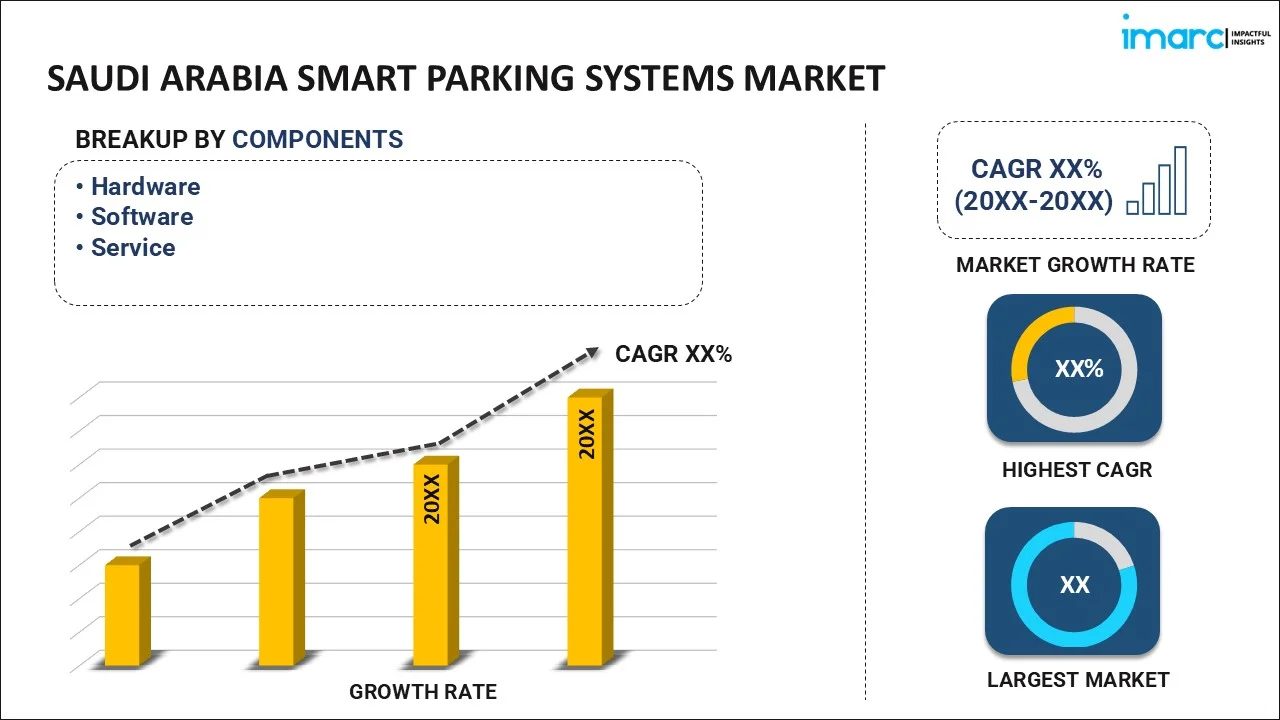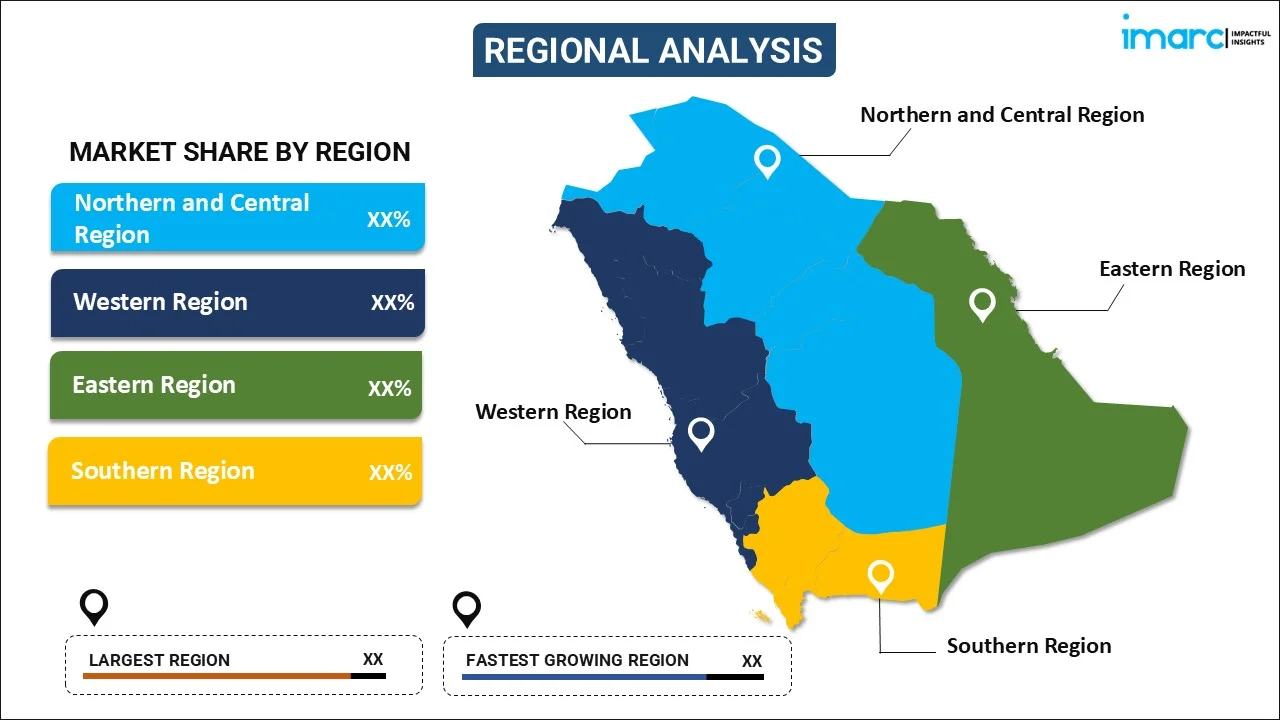
Saudi Arabia Smart Parking Systems Market Size, Share, Trends and Forecast by Component, Type, Application, and Region, 2025-2033
Saudi Arabia Smart Parking Systems Market Overview:
The Saudi Arabia smart parking systems market size reached USD 51.03 Million in 2024. Looking forward, IMARC Group expects the market to reach USD 221.20 Million by 2033, exhibiting a growth rate (CAGR) of 16.50% during 2025-2033. The market is experiencing robust growth, primarily driven by increasing urbanization, the implementation of government sustainability initiatives, growing vehicle ownership, and rising demand for Internet of Things (IoT) solutions and digital platforms to improve traffic management.
|
Report Attribute
|
Key Statistics
|
|---|---|
|
Base Year
|
2024
|
|
Forecast Years
|
2025-2033
|
|
Historical Years
|
2019-2024
|
| Market Size in 2024 | USD 51.03 Million |
| Market Forecast in 2033 | USD 221.20 Million |
| Market Growth Rate (2025-2033) | 16.50% |
Saudi Arabia Smart Parking Systems Market Trends:
Expansion of Urban Infrastructure and Smart City Projects
The Saudi Arabia smart parking systems market growth is driven by the large-scale projects like Vision 2030, as they are reshaping the nation’s infrastructure. This expansion includes the development of smart cities, such as NEOM and the Red Sea Project, which are incorporating improved infrastructure where smart parking is vital. For example, Saudi Vision 2030 supports the partnership because it promotes the development of smart cities as well as enhanced urban mobility systems. The strategic merger between Parkin and BATIC utilizes their operational knowledge to establish customer-oriented parking solutions through their extensive local infrastructure for the benefit of residents and visitors. Moreover, urban development at an accelerated rate generates more traffic congestion as well as exceeds parking needs in densely populated areas. Besides this, the parking systems incorporate IoT-based sensors and automated ticketing mechanisms with mobile applications which function to enhance traffic flow and optimize parking system operations in highly populated urban areas. These systems direct users to accessible parking spaces so they no longer need to spend time searching for available spots thus enhancing urban mobility. Furthermore, the nation actively works to develop smart cities that match its mission to establish technologically sophisticated connected communities that deliver enhanced convenience and efficiency to residents. Apart from this, smart parking systems represent an essential component of urban planning because Saudi Arabia requires systems to manage its growing population and increasing number of vehicle owners, thus impelling the market demand.
Emphasis on Sustainability and Environmental Goals
Sustainability at the forefront of Saudi Arabia’s national policies is reducing emissions and promoting efficient energy use, which is driving the Saudi Arabia smart parking systems market growth. Smart parking systems are supporting these objectives by reducing the time vehicles spend circling in search of the parking which helps in lowering fuel consumption and emissions. For instance, Riyadh launched its solar-powered parking system in September 2024 through the deployment of 500 solar-powered payment machines. The project works to update parking technology and achieve an annual carbon dioxide reduction of up to 560 kg per machine. Additionally, parking solutions are incorporating features, such as electric vehicle (EV) charging stations, which encourage EV adoption and align with the country’s environmental aims. Besides this, the government’s emphasis on sustainability is shaping the demand for ecofriendly infrastructure which is motivating cities and the private sector to adopt solutions that optimize parking and reduce carbon footprints. Furthermore, smart parking systems facilitate optimal space utilization, prompting eco-friendly urban layouts with reduced land consumption for parking. Concurrently, in a region traditionally dependent on oil, these systems are part of a broader shift toward environmental consciousness which is reflecting Saudi Arabia’s commitment to international sustainability standards and reinforcing the importance of urban transport solutions with low emissions.
Adoption of Advanced Technology and IoT Integration
Saudi Arabia’s investment in digital technology is positioning IoT-driven solutions at the center of its urban transformation and boosting the Saudi Arabia smart parking systems market share. In smart parking systems, IoT enables real-time data which is gathered with the sensors and cameras, providing continuous updates on parking availability and occupancy. This information is accessible through mobile applications which allow the drivers to book parking spots on time and helps in reducing congestion while enhancing the user experience. IoT integration has immensely streamlined the parking process, which provides valuable data to parking operators and city planners, allowing them to analyze patterns in occupancy and optimize space allocation. For example, ParkPoint unveiled cutting-edge parking solutions at the Smart Cities Saudi Expo 2024, showcasing advancements in IoT-driven parking technologies. These innovations highlight the growing role of smart parking in urban development, demonstrating how real-time data and automation enhance efficiency and user convenience. Besides this, the integration of machine learning (ML) and predictive analytics further elevates system efficiency by forecasting the parking demand and dynamically adjusting resources. This tech-driven approach is attracting a digitally savvy population and aligning with Saudi Arabia’s smart city vision, where connected devices play an important role in urban management. By transforming parking spaces into intelligent infrastructure, the adoption of IoT-powered smart parking is aligning with the nation’s ambition to become a global leader in innovation-driven urban development.
Saudi Arabia Smart Parking Systems Market Segmentation:
IMARC Group provides an analysis of the key trends in each segment of the market, along with forecasts at the region level for 2025-2033. Our report has categorized the market based on component, type, and application.
Component Insights:

- Hardware
- Pucks
- Cameras and LPRs
- Smart meters
- Signage
- Parking gate
- Software
- Parking guidance system
- Analytics solution
- Service
- Consulting services
- Engineering services
- Mobile app parking services
The report has provided a detailed breakup and analysis of the market based on the component. This includes hardware (pucks, cameras and LPRs, smart meters, signage, parking gate), software (parking guidance system, analytics solution), and service (consulting services, engineering services, mobile app parking services).
Type Insights:
- On-street Parking
- Off-street Parking
- Garage
- Lot
A detailed breakup and analysis of the market based on the type have also been provided in the report. This includes on-street parking, and off-parking (garage, lot).
Application Insights:
- Commercial
- Government
- Transport Transit
The report has provided a detailed breakup and analysis of the market based on the application. This includes commercial, government, and transport transit.
Regional Insights:

- Northern and Central Region
- Western Region
- Eastern Region
- Southern Region
The report has also provided a comprehensive analysis of all the major regional markets, which include Northern and Central Region, Western Region, Eastern Region, and Southern Region.
Competitive Landscape:
The market research report has also provided a comprehensive analysis of the competitive landscape. Competitive analysis such as market structure, key player positioning, top winning strategies, competitive dashboard, and company evaluation quadrant has been covered in the report. Also, detailed profiles of all major companies have been provided.
Saudi Arabia Smart Parking Systems Market News:
- In April 2024, a subsidiary of BATIC Investment and Logistics Company signed a framework agreement with 'solutions' to provide skilled personnel and operational mechanisms for managing, operating, and maintaining smart public parking spaces in Riyadh. This collaboration is expected to significantly impact BATIC's revenue, reflecting the growing emphasis on smart parking solutions in the capital.
- In January 2024, Arabian Internet and Communications Services Co. (solutions) entered a 10-year agreement with Remat Al-Riyadh Development Co. to develop, manage, and maintain smart public parking spaces in Riyadh. This initiative aims to cover 164,000 public parking spaces across 12 zones, integrating modern technologies to improve traffic flow and reduce unauthorized parking.
Saudi Arabia Smart Parking Systems Market Report Coverage:
| Report Features | Details |
|---|---|
| Base Year of the Analysis | 2024 |
| Historical Period | 2019-2024 |
| Forecast Period | 2025-2033 |
| Units | Million USD |
| Scope of the Report | Exploration of Historical Trends and Market Outlook, Industry Catalysts and Challenges, Segment-Wise Historical and Future Market Assessment:
|
| Components Covered |
|
| Types Covered |
|
| Applications Covered | Commercial, Government, Transport Transit |
| Regions Covered | Northern and Central Region, Western Region, Eastern Region, Southern Region |
| Customization Scope | 10% Free Customization |
| Post-Sale Analyst Support | 10-12 Weeks |
| Delivery Format | PDF and Excel through Email (We can also provide the editable version of the report in PPT/Word format on special request) |
Key Questions Answered in This Report:
- How has the Saudi Arabia smart parking systems market performed so far and how will it perform in the coming years?
- What is the breakup of the Saudi Arabia smart parking systems market on the basis of component?
- What is the breakup of the Saudi Arabia smart parking systems market on the basis of type?
- What is the breakup of the Saudi Arabia smart parking systems market on the basis of application?
- What is the breakup of the Saudi Arabia smart parking systems market on the basis of region?
- What are the various stages in the value chain of the Saudi Arabia smart parking systems market?
- What are the key driving factors and challenges in the Saudi Arabia smart parking systems?
- What is the structure of the Saudi Arabia smart parking systems market and who are the key players?
- What is the degree of competition in the Saudi Arabia smart parking systems market?
Key Benefits for Stakeholders:
- IMARC’s industry report offers a comprehensive quantitative analysis of various market segments, historical and current market trends, market forecasts, and dynamics of the Saudi Arabia smart parking systems market from 2019-2033.
- The research report provides the latest information on the market drivers, challenges, and opportunities in the Saudi Arabia smart parking systems market.
- Porter's five forces analysis assist stakeholders in assessing the impact of new entrants, competitive rivalry, supplier power, buyer power, and the threat of substitution. It helps stakeholders to analyze the level of competition within the Saudi Arabia smart parking systems industry and its attractiveness.
- Competitive landscape allows stakeholders to understand their competitive environment and provides an insight into the current positions of key players in the market.
Need more help?
- Speak to our experienced analysts for insights on the current market scenarios.
- Include additional segments and countries to customize the report as per your requirement.
- Gain an unparalleled competitive advantage in your domain by understanding how to utilize the report and positively impacting your operations and revenue.
- For further assistance, please connect with our analysts.
 Request Customization
Request Customization
 Speak to an Analyst
Speak to an Analyst
 Request Brochure
Request Brochure
 Inquire Before Buying
Inquire Before Buying




.webp)




.webp)












